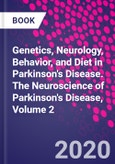Table of Contents
Part I: Genetics, molecular and cellular biology
2. Alpha-synuclein gene and Parkinson's diseaseAthina-Maria Simitsi, Chistos Koros and Leonidas Stefanis
3. The DJ-1 gene and protein: links with Parkinson's diseaseVanessa J. Musco, Sarah J. Annesley and Paul R. Fisher
4. Regulation of tyrosine hydroxylase: relevance to Parkinson's diseaseGelareh Alam and Jason R. Richardson
5. Linking glucocerebrosidase gene (GBA) variants and Parkinson's diseasectoria Berge-Seidl and Mathias Toft
6. Astrocytes and microglia in Parkinson's disease and animal modelsKatarzyna Kuter
7. The role of autophagy in Parkinson's disease etiopathogenesisEmanuel Candeias, J�ao Duarte Magalh�es, Daniel Santos, Helena Costa, Diana F. Silva, Ana Raquel Esteves and Sandra Morais Cardoso
8. The mitochondrial network in Parkinson's diseaseAndreas Aufschnaiter, Verena Kohler and Sabrina B�ttner
9. Signal transduction in Parkinson's disease: modulation of neurotransmission, symptomatology, and therapyMattia Volta
10. Oxidative stress signaling and regulated cell death in Parkinson's diseaseCarlos Velez-Pardo and Marlene Jimenez-Del-Rio
11. Subcellular-specific alpha-synuclein in Parkinson's diseaseBenjamin Rosen, Ketan S. Patil, Guido W. Alves and Simon G. M�ller
12. Melanocortin 1 receptor: Parkinson's disease, melanoma risk, and neuroprotectionGemma Tell-Marti, Joan Anton Puig-Butill� and Susana Puig
13. Energy regulation and Parkinson's diseaseLiting Hang and Kah-Leong Lim
14. Linking rotigotine, Parkinson's disease, and brain-derived neurotrophic factorKazuhiro Sohya, Kazunori O'Hashi and Hiroshi Kunugi
Part II: Neurology, physiology and imaging
15. The different syndromes in Parkinson's disease: an overviewNikolaos Giagkou and Maria Stamelou
16. Neuromolecular imaging in Parkinson's diseasePatricia A. Broderick and Leslie Wenning
17. Interlinking brain mapping and Parkinson's disease: MRI analysis, nigrosome 1 and nigrosome 4Eung Yeop Kim, Young Hee Sung and Jongho Lee
18. Interconnecting Parkinson's disease: the use of computed tomography and microelectrode recording in DBS surgeryRyan B. Kochanski and Sepehr Sani
19. Linking diffusion tensor imaging, microstructures and Parkinson's diseaseYu Zhang, Norbert Schuff, I-Wei Wu and Duygu Tosun
20. Detecting parkinsonian degeneration in lateroventral tier of substantia nigra pars compacta with MRIJason Langley, Daniel E. Huddleston and Xiaoping P. Hu
21. Vagal motoneurons in Parkinson's diseaseRuth E. Musgrove, Wei-Hua Chiu and Joshua A. Goldberg
22. Circadian clock disruption and neuroinflammation in Parkinson's disease: a new perspective Elisabetta Lauretti and Domenico Pratic�
23. Motor cortex stimulation in Parkinson's diseaseAngelo Lavano, Giusy Guzzi, Attilio Della Torre and Domenico La Torre
24. Action programming disorders associated with Parkinson's diseaseKenneth M. Heilman
25. The striatal medium spiny neurons: what they are and how they link with Parkinson's diseaseFu-Ming Zhou
26. Disruptions of frontostriatal language functions in Parkinson's diseaseAdolfo M. Garc�a, Yamile Bocanegra, Agustina Birba, Juan Rafael Orozco-Arroyave, Lucas Sede�o and Agust�n Iba�ez
27. Alpha-synuclein and neuroinflammation in Parkinson's diseaseTatiana Varanita and Luigi Bubacco
28. Tau and its interactions with other proteins in neurodegenerative diseasesKatelyn H. Mroczek, Sarah J. Annesley and Paul R. Fisher
29. Interaction between brain angiotensin and dopaminergic systems and Parkinson's diseaseJose Luis Labandeira-Garcia, Pablo Garrido-Gil, Maria A. Pedrosa, Carmen M. Labandeira and Ana I. Rodriguez-Perez
30. Restoring dopamine levels in Parkinson's disease: neuronal pathways, agonists and antiinflammatory agents�gatha Oliveira-Giacomelli, C.M. Albino, Hellio Danny N�brega de Souza and Henning Ulrich
Part III: Behaviour and psychopathology
31. Motivation and motivational aspects of Parkinson's diseaseAbdeslam Chagraoui, Emilie Puginier and Philippe De Deurwaerd�re
32. Linking anxiety, cognitive and sensory deficits to gait and balance deficits in Parkinson's diseaseQuincy J. Almeida
33. Motor programs interlinking gait and bradykinesia in Parkinson's diseaseTateo Warabi, Kiyoharu Inoue and Nobuo Yanagisawa
34. Olfactory disturbances in Parkinson's diseaseLais S. Rodrigues, Juliane Fagotti, Adriano D.S. Targa, Ana Carolina D. Noseda, Jessica L. Ilkiw, Flavia W.C. Dorieux and Marcelo M.S. Lima
35. Interlinking dementia in Parkinson's disease: nutritional correlates of body compositionArthur Oscar Schelp, J�ssica Emy Komuro, Jos� Eduardo Corrente and Silvia Justina Papini
36. The role of the gastrointestinal system and gut microbiota in Parkinson's diseaseJade Kenna and Ryan S. Anderton
37. Swallowing impairment in Parkinson's diseaseMaira Rozenfeld Olchik, Marina Padovani and Annelise Ayres
38. The Mini Nutritional Assessment (MNA) and applications to Parkinson's diseaseSvetlana Tomic
39. The efficacy of Bacopa monnieri extract in modulating Parkinson's diseaseDr. Ravikumar Hosamani
Part V: Models, modelling and resources
40. 6-hydroxydopamine-induced model of Parkinson's diseaseKatarzyna Kaczynska and Kryspin Andrzejewski
41. Knockdown transgenic Drosophila and Parkinson's diseaseMarlene Jimenez-Del-Rio and Carlos Velez-Pardo
42. Neuroprotection in animal models of Parkinson's disease: exploring exercise, sound, and lightJohn Mitrofanis
43. Modeling with the A53T a-synuclein model of Parkinson's diseaseThomas Musacchio, James B. Koprich and Chi Wang Ip
44. Linking the leucine-rich repeat kinase 2 gene, animal models, and Parkinson's diseaseYulan Xiong and Jianzhong Yu
45. Neuroscience of Parkinson's disease: recommended reading and resourcesRajkumar Rajendram, Vinood B. Patel and Victor R. Preedy








